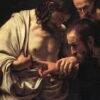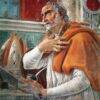Tag: Christ
November 24, 2024–The Reign of Christ
Warm-up Question What is your favorite holiday? Share some of the reasons why you prefer that celebration. Holiday Origin Stories Every year we celebrate a number of holidays. Some are national in origin, which is why Independence Day is on July 4th in the United States of America, September 16th in Mexico, and June 26th in Madagascar. Others have deep religious meaning, like Christmas, Easter, and Halloween, though each of those holidays now have many secular elements as well. Too often, we only tell one part of the holiday’s origin story. Take, for instance, the celebration of Christmas. Of course,…
Christ is Risen! As the Basis for Freedom Before God and Others
The following is a post I wrote quite a few years ago where I reflect on the implications of the resurrection of Jesus Christ. It is both devotional, personal, and a little academic in orientation; but I think it’s fitting for today. Christ is risen! I really struggled with a false sense of guilt and condemnation for particular sins from my past for years upon years. The enemy of my soul kept me living under ‘a yoke of bondage’ that Jesus said I ‘would be free indeed’ from. The Lord did not leave me as an orphan though, by the…
The Christ, as God’s Unconditionally Elect Human for the World
Christ’s atonement is limited to Christ’s vicarious humanity for the world. As the ‘firstborn from the dead’ He is the second and greater Adam, wherein all of humanity, from Christ’s elect humanity, comes to have the capacity, in echo of Christ’s Yes and Amen for us, to say Yes and Amen by the Spirit, to the Father. Christ is God’s unconditionally elect human for the world, and it is in His humanity that we come to have the capacity to truly be human; insofar that the entailments of what it means to be genuinely human is to be in right…
Countering the Abstract Faith of Augustine and Pelagius with the Concrete Faith of Christ
An abstract notion of saving faith, based on an abstract, or even undefined doctrine of election, always must attempt to make itself concrete. It must seek a way to fill in the gap created by a notion of faith wherein the believer believes out of an idea of faith that is seemingly inherent to them, or individually gifted to THEM. The antidote to this abstract notion of faith is to come to understand that people believe or trust out of Christ’s vicarious faith for us. It is by His poverty for us that we have become rich; that we can…
The Work of Christ is the Person of Christ: Against Dualistic Classical Theology
When the work of Christ is separated from the person of Christ, all you can be left with are either pure Pelagian or semi-Pelagian doctrines of salvation; as that becomes funded by some functional type of an adoptionistic christology (e.g., Ebionism etc.) This is why TFT refers to the Latin Heresy: he is referring to theologies, Western-Augustinian ones, that ultimately don’t think salvation, as both objectified and subjectivized in the Monarxia of God in the person of Jesus Christ. When this or that individual person is understood as being “elect” of God, based on an arbitrary and hidden decree of…
The Particularity and Concreteness of Christ: Against Cultural “Christianities”
A genuine Christianity is not pluriform, it does not have multitudinous realities at its core. It is not a cluster of beliefs that likeminded people rally around. A genuine Christianity—its inner reality—is in fact a person; it is God for us in the vicarious humanity of Jesus Christ. When people exit or walk away from this or that perceived form or expression of the “Christian existence,” they aren’t walking away from Christianity’s inner reality, per se, if in fact they believe that to be exhaustively represented in the form of that, as they have come to experience that, in this…
Irenaeus as a Christ Conditioned Theologian
The following is taken from my final exam from my Patristic Theology class in seminary (circa 2003); we had to answer three out of five questions in essay form. This essay highlights the person and theology of Irenaeus. I will provide a brief description of Irenaeus first, and then get into the essay. This was before I ever started reading either Barth or Torrance in any depth. But you might see how once I did, I was already predisposed to their respective theologies vis-à-vis informing theologies like Irenaeus’ represents. Irenaeus (ca. 130-200) was Bishop of Lyons. Most likely he grew…
A Devotion: Christ, ‘Closer to us than we are to ourselves’
5 One person regards one day above another, another regards every day alike. Each person must be fully convinced in his own mind. 6 He who observes the day, observes it for the Lord, and he who eats, does so for the Lord, for he gives thanks to God; and he who eats not, for the Lord he does not eat, and gives thanks to God. 7 For not one of us lives for himself, and not one dies for himself; 8 for if we live, we live for the Lord, or if we die, we die for the Lord; therefore whether we live or die, we are the Lord’s. 9 For to this end Christ died…
Against the God of classical Calvinism and Arminianism From the For-ness of God for the World in Christ
The God of classical Calvinism and Arminianism is the same God, in the sense that their respective doctrines of God find resource in what Richard Muller identifies as ‘Christian Aristotelianism.’ How the Christian thinks of God will determine all else following, theologically. Since the actus purus (‘pure being’) god of Aristotle stands structurally and materially behind the way that Calvinism and Arminianism generally conceive of a God-world relation, what happens is that they must construct a system wherein this God remains untouched by said creation/world. In this effort, said systems have come to think of this God-world relation through a…
Our ‘Lost Time’ in the ‘New Time’ of the Saga of Jesus Christ: How Saga Functions in Barth’s Usage
Barth is often depicted as a liberal or “neoorthodox” theologian who repudiates the inerrancy of Holy Scripture, which alone anathematizes him for the evangelical. Barth is often presented as an enemy to conservative orthodox Christianity, with his neo-Kantian, reified Hegelianism ripping to shreds any hope of giving the evangelical churches anything wholesome and genuinely biblical to cogitate upon. Barth, in many sectors of the evangelical and Reformed churches, is considered as enemy of the state to the health and well-being of historically orthodox Christianity. Barth is often demonized, caricaturized, and flambéed just at the point that someone moves their lips into…









